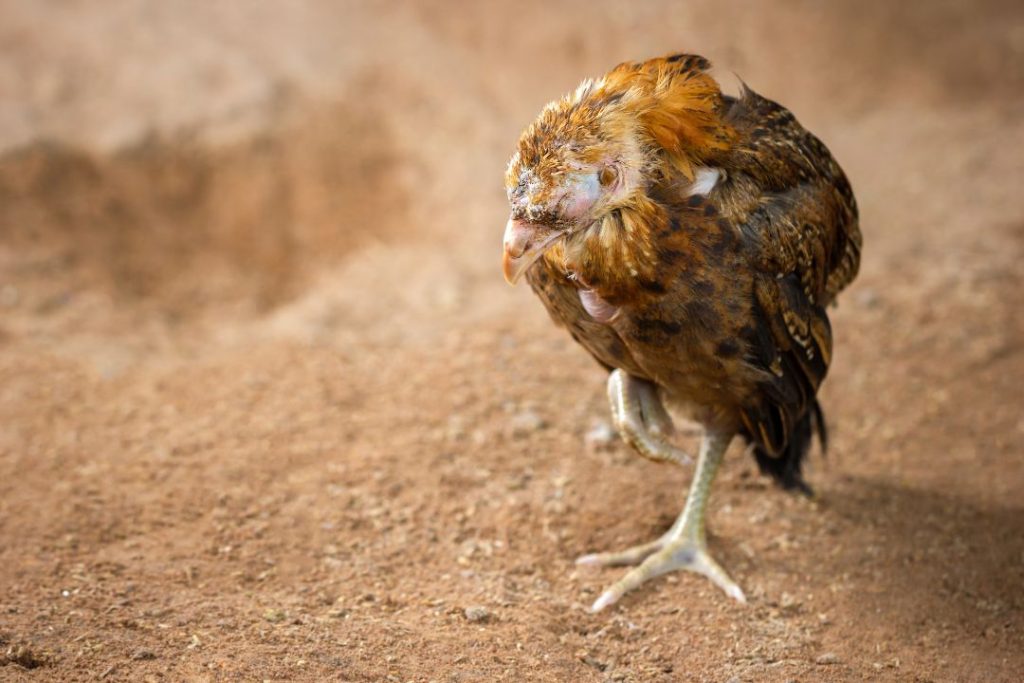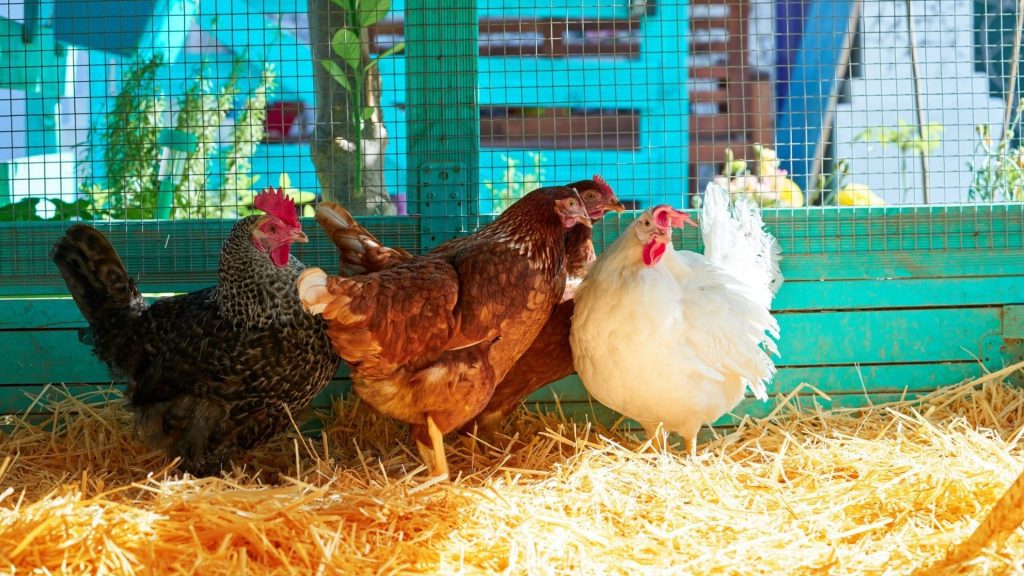If you’re a backyard chicken owner or a poultry farmer, knowing how to treat gapeworm in chickens is crucial for you.
Gapeworms in a chicken’s trachea can lead to severe respiratory distress. A high-pitched wheezing or gasping sound often characterizes it. This is commonly called ‘gaping,’ hence the name gapeworm.
However, regular deworming, maintaining clean coops, and limiting contact with wild birds are all crucial steps in keeping your flock gapeworm-free.
Throughout this article, we will guide you and provide valuable insights to ensure your flock stays healthy and gapeworm-free.
What Is Gapeworm?
Gapeworm, scientifically known as Syngamus trachea. It is a parasitic nematode that primarily targets the respiratory systems of birds, including chickens. This parasite is notorious for its unique Y-shaped structure. It firmly attaches itself to the trachea or windpipe of the host bird.
The name ‘gapeworm’ stems from infected birds’ gaping or gasping behavior as they struggle to breathe.
Adult gapeworms lay eggs in the trachea of the host bird. These eggs are then coughed up, swallowed, and excreted in the bird’s faeces. The eggs hatch into larvae. Then these are ingested by intermediate hosts such as earthworms or snails.
The larvae are released into the bird’s digestive system when a chicken consumes an infected intermediate host. This makes gapeworm a serious concern for backyard chicken owners and commercial poultry farmers.
How Chickens Contract Gapeworm
Direct Contact with Infected Birds
As a chicken owner, you must understand how your flock can contract gapeworm. One common way is through direct contact with infected birds. Gapeworms are contagious, and their eggs can easily spread from one bird to another through shared food, water, or even through their droppings.
If you introduce new birds to your flock, they could be carriers of gapeworm, unknowingly spreading the infection to your healthy birds. Therefore, quarantining new birds before integrating them with your existing flock is always a good practice.
Ingesting Infected Earthworms Or Snails
Another common way your chickens can contract gapeworm is by ingesting infected intermediate hosts, such as earthworms or snails. When your chickens peck at the ground for food, they may inadvertently consume these infected earthworms or snails, ingesting the gapeworm larvae.
Once inside your chicken’s body, these larvae migrate to the trachea, mature into adult worms, and start laying eggs, thus continuing the infection cycle.
The Risk for Free-Range Chickens
If you’re raising your chickens in a free-range environment, they are particularly susceptible to gapeworm infection. This is because they have more opportunities to come into contact with infected birds, earthworms, or snails in the outdoor environment.
While free-ranging has many benefits, it also exposes your chickens to various parasites, including tapeworms. Therefore, monitoring your free-range chickens closely for any signs of gapeworm infection and taking preventive measures to keep the risk at bay is crucial.
What Are the Symptoms Of Gapeworm In Chickens?
Identifying gapeworms in chickens can be challenging, but there are a few telltale signs to look out for. These are:
1. Spotting the Signs of Gapeworm
As a chicken owner, you must be able to identify the signs of a gapeworm in your flock. The symptoms can be subtle and sometimes mimic other respiratory conditions. There are a few telltale signs that can point toward a gapeworm infection.
2. Persistent Cough
Chickens with gapeworm often exhibit a distinctive cough as they struggle to clear the worms obstructing their trachea. This cough can be dry and harsh and is usually more pronounced when the chicken is excited or stressed.
3. Gasping for Air
Gaping, a common term for gasping for air, is another typical gapeworm symptom. This is because the worms restrict the chickens’ ability to breathe by obstructing their airways.
Your chicken may be trying to get more air by lengthening its neck and expanding its beak widely.
4. Loss of Appetite
A loss of appetite is another symptom that can point toward a gapeworm infection. Chickens with gapeworm often eat less due to discomfort and difficulty in breathing.
This may cause weight loss and a deterioration in general health. Investigate further if you find your chicken eating less frequently or losing weight.
5. Other Symptoms
In addition to these primary symptoms, chickens with gapeworm may also exhibit other signs, such as reduced egg production, lethargy, and a change in vocal sounds. In severe cases, chickens may collapse or die suddenly due to suffocation.
How To Treat Gapeworm in Chickens?
Diagnostic Methods for Gapeworm
Observing symptoms and conducting laboratory tests are typically employed when diagnosing gapeworm in your chickens. If you think your flock may have a gapeworm infection, you should consult a veterinarian for a more certain diagnosis.
A tracheal swab is when a little sample is obtained from your chicken’s windpipe using a swab by your veterinarian. The existence of gapeworms is then checked using a microscope on this sample.
In some circumstances, a post-mortem examination might be required, especially if the chicken suddenly passes. This enables the veterinarian to make a conclusive diagnosis by visually checking the trachea for the presence of gapeworms.
Medication and Dosage for Gapeworm
Once a gapeworm infection is confirmed, treatment should begin immediately. The normal course of treatment includes giving patients anthelmintic medications, which are made to either kill or incapacitate parasitic worms.
The severity of the infection and the size of your chicken will impact the amount of these medications. Your vet will provide specific dosage instructions based on these factors. It’s crucial to follow these instructions closely to ensure effective treatment.
Preventive Measures Against Gapeworm
While treating gapeworm is important, prevention is always better than cure. You can take several steps to lower the danger of gapeworm infection in your flock drastically. One of the best preventive strategies is routine deworming.
You must regularly administer deworming medicine to prevent potential parasites from infecting your chickens. Cleaning the coops regularly is another essential protective action.
You may lower the danger of infection and lessen the prevalence of parasites in your chicken coops by routinely cleaning and disinfecting them.
Final Thought
Knowing how to treat chicken gapeworms is vital for anyone involved in poultry farming. Diagnosing, treating, and preventing gapeworm is extremely important whether you keep chickens in your home or work as a professional poultry farmer.
You should now be fully aware of the warning signs to look out for, including a persistent cough, gasping for air, and lack of appetite. These symptoms should motivate you to consult a veterinarian and immediately start the required diagnostic tests.
Additionally, you are aware of the available therapeutic choices, chiefly using anthelmintic medications. To ensure effective therapy, keep in mind that the dosage and administration of these medications should always be done with a veterinarian’s supervision.



